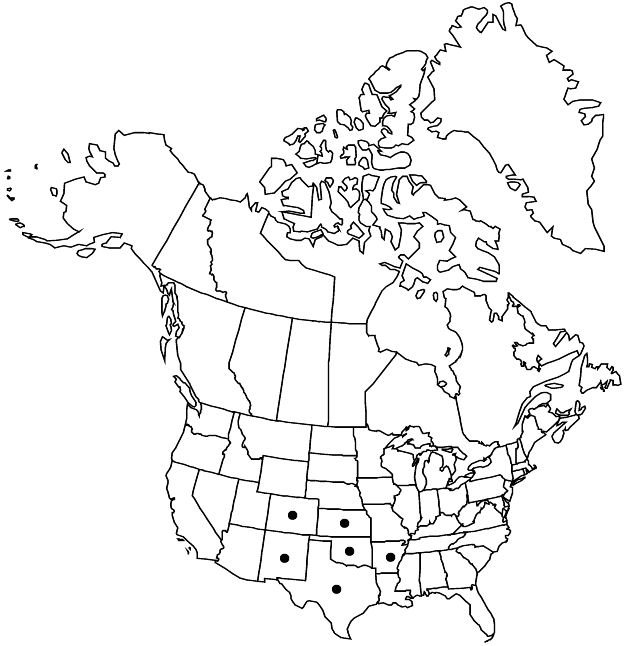Difference between revisions of "Argythamnia mercurialina"
Linnaea 34: 148. 1865. (as Argyrothamnia)
FNA>Volume Importer |
RevisionBot (talk | contribs) m (Bot: Adding category Revised Since Print) |
||
| (3 intermediate revisions by 2 users not shown) | |||
| Line 6: | Line 6: | ||
|place=34: 148. 1865 | |place=34: 148. 1865 | ||
|year=1865 | |year=1865 | ||
| + | |other_info_on_pub=(as Argyrothamnia) | ||
}} | }} | ||
|common_names=Tall silverbush | |common_names=Tall silverbush | ||
| Line 34: | Line 35: | ||
-->{{Treatment/Body | -->{{Treatment/Body | ||
| − | |distribution= | + | |distribution=Ark.;Colo.;Kans.;N.Mex.;Okla.;Tex. |
|discussion=<p>Varieties 2 (2 in the flora).</p> | |discussion=<p>Varieties 2 (2 in the flora).</p> | ||
|tables= | |tables= | ||
| Line 64: | Line 65: | ||
|basionyms=Aphora mercurialina | |basionyms=Aphora mercurialina | ||
|family=Euphorbiaceae | |family=Euphorbiaceae | ||
| − | |distribution= | + | |distribution=Ark.;Colo.;Kans.;N.Mex.;Okla.;Tex. |
|reference=None | |reference=None | ||
|publication title=Linnaea | |publication title=Linnaea | ||
|publication year=1865 | |publication year=1865 | ||
|special status=Endemic | |special status=Endemic | ||
| − | |source xml=https:// | + | |source xml=https://bitbucket.org/aafc-mbb/fna-data-curation/src/2e0870ddd59836b60bcf96646a41e87ea5a5943a/coarse_grained_fna_xml/V12/V12_803.xml |
|genus=Argythamnia | |genus=Argythamnia | ||
|species=Argythamnia mercurialina | |species=Argythamnia mercurialina | ||
}}<!-- | }}<!-- | ||
| − | -->[[Category:Treatment]][[Category:Argythamnia]] | + | --> |
| + | |||
| + | [[Category:Treatment]] | ||
| + | [[Category:Argythamnia]] | ||
| + | [[Category:Revised Since Print]] | ||
Latest revision as of 18:12, 6 November 2020
Herbs, perennial, monoecious or dioecious, to 8 dm. Stems usually erect, rarely prostrate in var. pilosissima, hairy, hairs malpighiaceous. Leaves: stipules deciduous, subulate to ovate, 0.3–0.5 mm, margins not glandular; petiole usually absent, rarely to 4 mm on proximal leaves; blade lanceolate, elliptic, ovate to obovate, 1.5–7.5 × 0.6–3.5 cm, margins entire or serrulate, without glands, surfaces hairy, hairs malpighiaceous. Inflorescences bisexual or unisexual, to 12 cm; bracts ovate to lanceolate, 1.5–2.5 mm, margins without glands. Flowers without pink dye when wetted. Staminate flowers: sepals lanceolate to narrowly elliptic, 2.3–3 × 0.7–0.8 mm; petals elliptic to spatulate, 2–2.5 × 0.8–1 mm, free from androphore; nectary glands linear to obovate, 0.3–0.5 × 0.1–0.2 mm, free from androphore, glabrous or pubescent; stamens 8, staminodes 0. Pistillate flowers: sepals elliptic, 1–7 × 0.3–3 cm, without glands; petals 0 or 5, elliptic, linear, or punctiform, less than 0.5 mm; nectary glands linear, 0.7 × 1.5 mm, glabrous or pubescent; ovary strigose; styles 0.8–1.5 mm, pubescent; stigmas flattened. Capsules 6–14 mm, hispidulous to strigose. Seeds 3.2–4.5 mm, smooth to slightly papillate.
Distribution

Ark., Colo., Kans., N.Mex., Okla., Tex.
Discussion
Varieties 2 (2 in the flora).
Selected References
None.